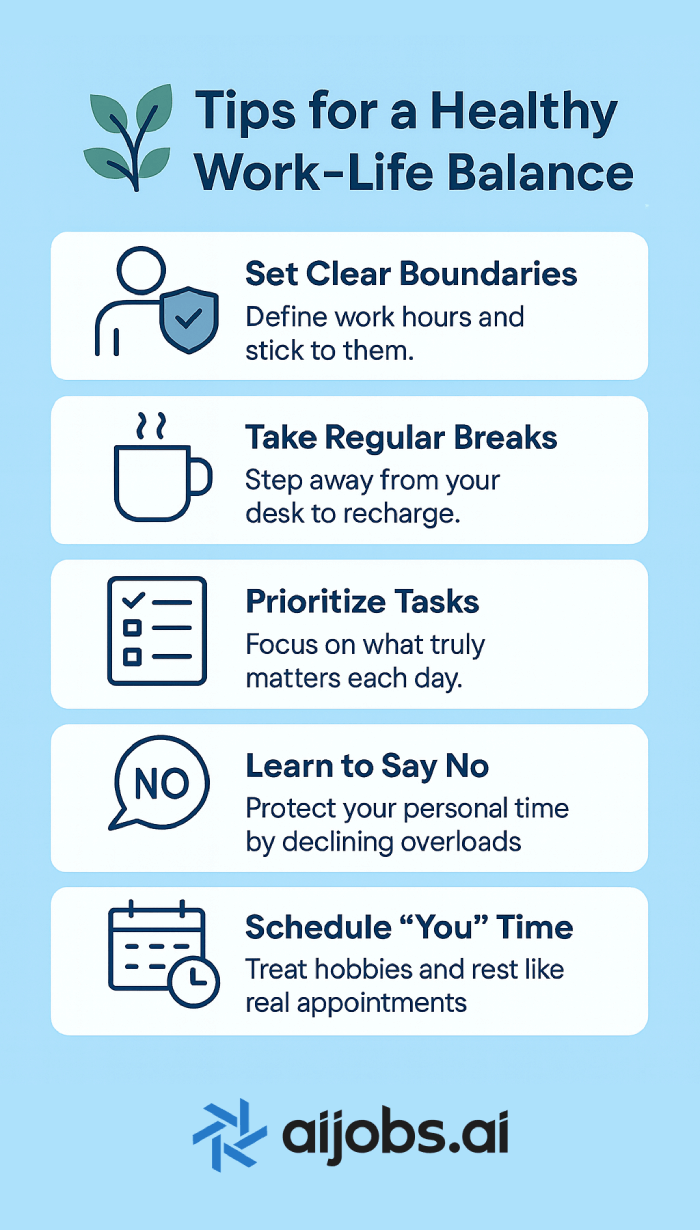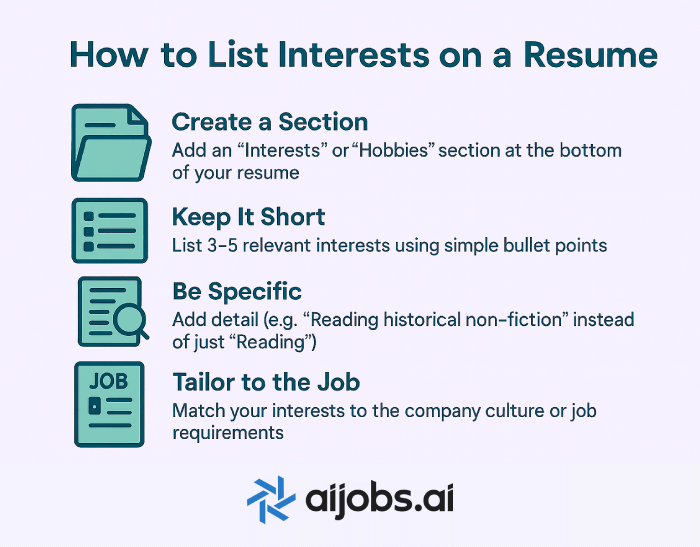40+ Best Interests to Put on a Resume (and What to Avoid)

Key Takeaways
- Choose interests to put on a resume that align with the job description, showcase your personality, and reflect the company’s values.
- Use the interests and hobbies section in your resume to demonstrate valuable soft and hard skills.
- Your interests section in your resume should be short and specific. Aim for three to five well-chosen points that add value.
Stay clear of controversial, generic, or high-risk interests that could be misinterpreted by a recruiter or hiring manager.
It might seem like a minor detail, but choosing the right interests to put on your resume can give you a surprising edge.
The interests you list help recruiters see you as a well-rounded person and can highlight valuable soft skills that your work history alone might not show.
In this guide, we’ll break down how to choose the best interests to list in a resume, why they matter, and which ones to avoid.
You’ll also find more than 40 examples of great hobbies and interests for resumes that can make your application more memorable and effective.
Should I Add Interests to a Resume?
Yes, but only when it adds value. Including interests on your resume can be a powerful way to stand out, especially in a competitive job market.
When deciding whether or not to include a personal hobby or interest on your resume, or any piece of information for that matter, always ask yourself this question: Will this detail help me get hired?
- Freddie Rohner, Certified Master Resume Writer at iHire
The right interests give recruiters a glimpse into your personality, show that you have a healthy work-life balance, and make you a more memorable candidate.

When to Include Interests in Your Resume
You should add interests to your resume when they enhance your professional profile or support your qualifications:
- You have limited work experience: For recent graduates or career changers, interests can demonstrate relevant skills and a strong work ethic when professional experience is thin.
- The interests highlight relevant skills: If your interest in coding has led you to build a personal app, that’s a valuable technical skill. If you lead a local sports team, that shows leadership.
- They align with the company culture: Research the company. If they have a "work hard, play hard" culture and organize team sports, mentioning your own athletic pursuits can show you're a great cultural fit.
- The company specifically asks for them: Some job applications, particularly in creative fields, may request this information to better understand your personality.
Related reading: 50+ Best Examples of Fun Facts About Yourself for Work
When to Leave Interests Off Your Resume
There are also times when it’s best to skip the interests section altogether:
- You're short on space: If you have extensive experience, prioritize that. Your professional accomplishments are more important than your hobbies and interests.
- Your interests are irrelevant or generic: Listing "watching movies" or "listening to music" without any specific context adds no value.
- They could be controversial: Avoid mentioning political affiliations, religious activities, or anything that could be polarizing unless you're applying to an organization where these are relevant (e.g., a political campaign).
Best Interests to Put on a Resume
The most effective interests to put on a resume are those that showcase transferable skills and reflect your personality.
Before listing anything, ask yourself: Does this interest demonstrate creativity, discipline, teamwork, or leadership?
To help you get started, here’s a curated list of top hobbies and interests for resumes, organized by category.
Looking for a new job? Check out all the open positions on AIJobs.ai. We feature positions from some of the world's leading tech companies.

Creative Interests for a Resume
Creative pursuits show you can think outside the box, solve problems in new ways, and pay attention to detail. These skills are valuable in almost any role.
- Photography: Demonstrates creativity, an eye for detail, and technical skill.
- Blogging/Writing: Highlights strong communication skills, self-discipline, and expertise in a particular niche.
- Playing a Musical Instrument: Shows dedication, patience, and fine motor skills.
- Drawing/Painting: Showcases creativity, patience, and attention to aesthetics.
- Podcasting: Implies strong communication, research, and technical audio skills.
- Creative Writing/Poetry: Signals imagination and a strong command of language.
- Graphic Design: A highly valuable technical skill demonstrating creativity and software proficiency.
- Sewing/Interior Design: Shows project management, attention to detail, and creativity.
Physical & Outdoor Interests for a Resume
These interests often suggest self-discipline, goal-setting, and resilience. They can also indicate that you value well-being and can handle pressure.
- Marathon Running: Shows commitment, discipline, and long-term goal setting.
- Team Sports (e.g., Basketball, Soccer): Highlights teamwork, communication, and leadership skills.
- Yoga/Meditation: Suggests focus, discipline, and an ability to manage stress.
- Hiking/Camping: Indicates planning, adaptability, and resilience.
- Cycling: Demonstrates endurance and dedication.
- Rock Climbing: Shows problem-solving skills, focus, and adaptability under pressure.
- Gardening: Highlights patience, planning, and attention to detail.
- Dancing: Can improve cognitive abilities and shows collaboration skills.
Tech & Digital Interests for a Resume
In a tech-driven world, showing you're comfortable with digital tools is a huge plus. These interests can highlight both hard and soft skills.
- Coding/Web Development: A direct technical skill that’s highly sought after.
- Building PCs: Shows technical proficiency and problem-solving abilities.
- Video Game Design: Highlights a blend of creativity and technical skill.
- Managing a Social Media Community: Demonstrates communication, marketing, and engagement skills.
- Data Visualization: An analytical skill that shows you can interpret and present complex information.
- Robotics: Indicates advanced problem-solving and technical expertise.
- Creating Mobile Apps: A clear demonstration of programming and project management skills.
Social & Team Interests for a Resume
These activities demonstrate that you work well with others, a crucial skill in any professional environment.
- Volunteering: Shows empathy, a strong work ethic, and community-mindedness.
- Mentoring/Coaching: Highlights leadership, communication, and interpersonal skills.
- Organizing Local Events: Demonstrates project management, organization, and teamwork.
- Joining a Book Club: Shows communication, critical thinking, and a willingness to consider different perspectives.
- Team-Based Strategy Games (e.g., Dungeons & Dragons): Signals creativity, collaboration, and problem-solving.
- Participating in a Trivia Team: Highlights teamwork and a broad knowledge base.
- Volunteering for a Neighborhood Cleanup: Shows initiative and a commitment to community.
Cultural & Global Interests for a Resume
In a globalized economy, having a multicultural perspective is a valuable asset. These interests show you are open-minded and adaptable.
- Learning New Languages: Indicates cognitive ability, dedication, and cross-cultural communication skills.
- International Travel: Shows adaptability, planning, and an appreciation for different cultures.
- Cooking International Cuisines: Highlights creativity, an interest in other cultures, and the ability to follow detailed instructions.
- Attending Multicultural Festivals: Shows curiosity and respect for diverse perspectives.
- Studying History or Art History: Demonstrates research skills and an analytical mindset.
Personality-Driven Interests for a Resume
Some interests give a powerful glimpse into your core personality traits, like your analytical abilities or strategic thinking.
- Chess or Strategic Board Games: Highlights strategic thinking, planning, and foresight.
- Puzzles (e.g., Sudoku, Crosswords): Shows problem-solving skills and attention to detail.
- Public Speaking/Debate Club: Demonstrates strong communication skills, confidence, and persuasive abilities.
- Investing/Stock Market Analysis: Highlights analytical skills and financial literacy.
- Reading Non-Fiction: Shows a commitment to continuous learning and knowledge acquisition.
- Watching Documentaries: Indicates curiosity and a desire to understand complex topics.
The Difference between Interests and Hobbies
While many people use the terms interchangeably, there’s a subtle difference between hobbies and interests on a resume.
- Interests are subjects or topics you enjoy learning about. This engagement is often more passive. For example, you might have an interest in ancient history, which you satisfy by reading books or watching documentaries.
- Hobbies are activities you actively and regularly participate in. This is a more hands-on pursuit. For instance, if you have a hobby of cooking, you actively try new recipes and practice your techniques.
When deciding which interests to put on a resume, don’t worry too much about labeling them precisely. It’s perfectly fine to group them together under a single heading like “Hobbies & Interests.”
The goal is to give recruiters a better sense of your personality, values, and transferable skills.
Your hobbies section could mark the difference between you and another candidate.
How to List Interests on a Resume
Adding an interests section is simple, but there are a few best practices to follow.
- Create a Dedicated Section: Add a section at the bottom of your resume titled "Interests," "Hobbies & Interests," or “Personal Interests.”
- Keep it Short and Sweet: List three to five of your most relevant interests. Use a bulleted list to make it easy to read.
- Be Specific: Instead of writing "Reading," try "Reading historical non-fiction." Instead of "Cooking," consider "Experimenting with Southeast Asian cuisine." This adds more personality and context.
- Tailor it to the Job: Just like the rest of your resume, customize your interests for each job you apply for. Review the job description and company website, and choose interests that align with their values and required skills.

Here’s an example of what it might look like:
Interests
- Marathon Running (completed the NYC Marathon in 2023)
- Volunteering as a youth soccer coach
- Learning Python through online courses
- Hosting a weekly Dungeons and Dragons board game night
Interests and hobbies should typically be kept towards the bottom of your resume when included. Consider them as more of a footnote that gives some insight into the motivations you have outside of work.
- Uptowork
How Recruiters View Resume Interests
Recruiters are people too, and they're often looking for candidates who will fit in with the team.
An interests section helps them see you as more than just a list of qualifications. It can serve as a great icebreaker during an interview and help build a personal connection.
A well-crafted interests section suggests you are a motivated, engaged, and well-rounded individual.
For example, mentioning you play a team sport signals you're collaborative. Listing a creative hobby like photography shows you have an eye for detail.
These small details can make a big difference when a recruiter is deciding between two otherwise identical candidates.
Interests You Should Avoid Putting on a Resume
Just as the right interests can help you, the wrong ones can hurt your chances. Here’s what to leave off your resume:
- Controversial Topics: Avoid anything related to politics or religion unless it's directly relevant to the role (e.g., working for a non-profit with a religious affiliation).
- Generic Interests: "Watching TV," "socializing with friends," or "listening to music" are too common and don't add any real value.
- Potentially Solitary or Antisocial Activities: While there's nothing wrong with enjoying solo activities, framing them poorly can be a red flag. For example, listing "video gaming for 40 hours a week" might suggest you lack social skills or have time management issues.
- Anything Unprofessional or Illegal: This should go without saying, but interests like "partying" or "gambling" have no place on a professional document.
Frequently Asked Questions
Is it better to list hobbies or interests?
You can list either or both. "Hobbies" suggests active participation, while "interests" can be more about learning. Both can be valuable.
Choose the term that best fits your activities, or simply use the heading “Interests.”
Where does the interests section go on a resume?
It should be the last section on your resume, after your professional experience, skills, and education.
It's a supplementary section, so your primary qualifications should always come first.
Polish Your Resume and Make an Impression
You should think of your resume as your personal marketing document, and every word should be chosen with care.
While your experience and skills are the main highlight, a thoughtful interests section can be the perfect finishing touch. It adds personality, highlights hidden skills, and helps you connect with recruiters on a human level.







